Start Licensing’s Ian Downes does some research into food and drink licensing this week in preparation for an upcoming event.
In preparation for a panel discussion I am hosting at the IFE Manufacturing Show in a couple of weeks, I spent some time this week making store visits to look out for examples of licensing in the food and drink category.
The discussion I am hosting is entitled ‘Expanding a brand: a licensing masterclass’. Quite a billing but I will have the very experienced and successful licensee Brand of Brothers by my side. Brand of Brothers is an expert in developing frozen iced refreshment products – aka ice lollies – and has developed products with brands such as R Whites, Tango and Robinson’s. It is good to see a trade show like IFE acknowledging and including licensing within its education strand. It is a good sign that licensing is increasingly on the radar of food and drink companies. Some of the in-market examples I spotted this week reinforced that point.
Guinness is a great example of a brand that has embraced licensing and uses it to extend its reach. In its case, a key point is developing products that are a good brand fit in terms of an eating occasion, but are also able to deliver the brand’s taste and flavour profile effectively. It has worked with crisp manufacturer Burt’s for quite some time now and I spotted a Guinness Rich Chilli sharing bag in my local farm shop. The product uses the signature Guinness colourways and harp device well. From Guinness’ perspective, having a product in distribution in farm shops is probably welcome in the context of being a brand reminder for consumers plus, of course, Guinness crisps allow them a further opportunity to be involved in occasions where family and friends catch up.
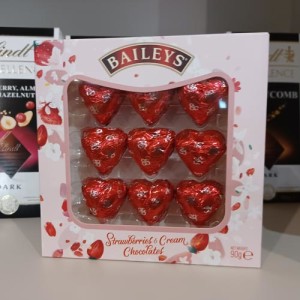 In a similar vein, and in the same retailer, Baileys was well represented with a Strawberries & Cream Baileys Easter Egg and Chocolates. These products place Baileys in a gifting context and also provide a new way to get new flavour variants not the market. For brands like Guinness and Baileys, a key consideration in licensing is making sure the taste and flavour experience is authentic and ‘on brand’.
In a similar vein, and in the same retailer, Baileys was well represented with a Strawberries & Cream Baileys Easter Egg and Chocolates. These products place Baileys in a gifting context and also provide a new way to get new flavour variants not the market. For brands like Guinness and Baileys, a key consideration in licensing is making sure the taste and flavour experience is authentic and ‘on brand’.
An area of food licensing that is well developed and appears to be buoyant is that of celebrity chefs. There are a number of well established ranges in the market. In my local Waitrose I actually saw three ranges selling side by side. This brigade of celebrity chefs was lead by Jamie Oliver. His food ranges marketed under a ‘no fuss food’ strapline seem to be working well – the products I saw were Quinoa based ones. Interestingly the packaging for Jamie’s ranges are rather like his personality, bright and breezy but also include serving suggestion and recipe ideas – this latter point is a neat detail and helps keep the product range on point
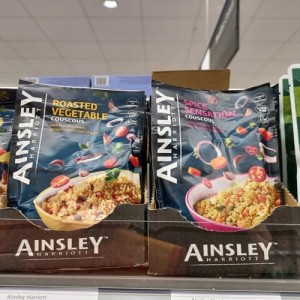 His celebrity colleagues on shelf were Ainsley Harriott and Loyd Grossman. In both cases, these product ranges have been in the market for some time and in many respects are established as food brands in their own right. This is an interesting point to note in that a successful launch into the food and drink category can see a product range established as a long-term one. Indeed, manufacturers in this category are keen to work with brands they feel will have long-term potential as the cost of developing, listing and launching a new product in the FMCG category can be high both in financial and resource terms.
His celebrity colleagues on shelf were Ainsley Harriott and Loyd Grossman. In both cases, these product ranges have been in the market for some time and in many respects are established as food brands in their own right. This is an interesting point to note in that a successful launch into the food and drink category can see a product range established as a long-term one. Indeed, manufacturers in this category are keen to work with brands they feel will have long-term potential as the cost of developing, listing and launching a new product in the FMCG category can be high both in financial and resource terms.
Another chef making an impact through licensing is Paul Hollywood. He has a range of ‘ready to bake’ bread rolls in market at the moment. A sensible product category to start licensing from. Another interesting development in the bakery sector in Waitrose is that it sells bakery products such as bread and rolls supplied by Gail’s Bakeries. Gail’s is a high street bakery and café chain. While this is, as I understand, a supply deal rather than a licensing deal it is a great example of how retailers are working together to broaden their reach and widen brand experiences. We seem to be seeing more examples of retail brands popping up in other retailers.
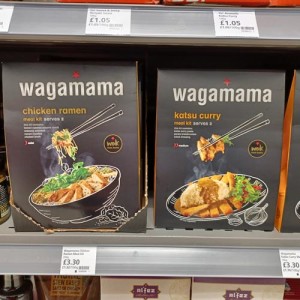 Another category of brand that seems to be thriving is that of restaurant brands. Licensee All About Food is particularly adept at developing opportunities from this category. Current ranges in retail include ones featuring Wagamama, Pizza Express and Yo!
Another category of brand that seems to be thriving is that of restaurant brands. Licensee All About Food is particularly adept at developing opportunities from this category. Current ranges in retail include ones featuring Wagamama, Pizza Express and Yo!
In turn, these reflect consumer trends in terms of style of cuisine and in the light of lockdown a move to more ‘restaurant dining’ at home. All About Food has managed to edit the restaurant experience well and has developed products in very easy to use convenient formats and variants.
Again, here the power and appeal of the brand is a key to success. There has to be a judgement call on when is the best time to launch and what products to launch with. Retail products also help the restaurant brands build up brand loyalty and provide a platform for cross promotions.
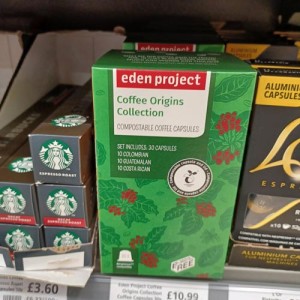 A couple of developments in the tea and coffee category caught my eye as well. Within the fast growing category of coffee capsules there was an Eden Project branded product. The Eden Project Coffee Origins Collection includes 30 capsules with three varieties of coffee, but crucially the coffee capsules are compostable.
A couple of developments in the tea and coffee category caught my eye as well. Within the fast growing category of coffee capsules there was an Eden Project branded product. The Eden Project Coffee Origins Collection includes 30 capsules with three varieties of coffee, but crucially the coffee capsules are compostable.
It is a great way of the Eden Project playing in the category and conveying a message to consumers.
It was also interesting to see tea brand Dorset Tea partnering with the Marine Conservation Society. This is a very positive partnership and positions Dorset Tea as a caring brand, but also given its geographical positioning it is a nice way of supporting a charity that is relevant to its ‘home’ area.
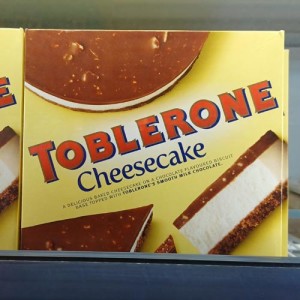 Finally, it was interesting to see licensing playing a role in the frozen category as well. I spotted two examples of confectionery brands that have used licensing as way of jumping into frozen desserts and ice cream.
Finally, it was interesting to see licensing playing a role in the frozen category as well. I spotted two examples of confectionery brands that have used licensing as way of jumping into frozen desserts and ice cream.
Toblerone has a frozen cheesecake in the market, while Maltesers has a new Dark Chocolate hand held ice cream product in the market. These are two great examples of how well established brands can make a real impact in a new category, particularly when they are brands with a distinct taste and flavour profile coupled with a strong brand identity. This really underpins the value of licensing in the food and drink space.
Hopefully I will see some of you at the IFE Show – for details of the event, check here: https://www.ifemanufacturing.co.uk/seminar-programme
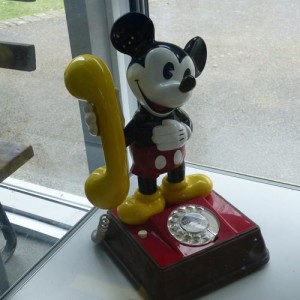 Outside of the world of food and drink, I was reminded of a licensing category that has gone out of fashion during a visit to Amberley Museum.
Outside of the world of food and drink, I was reminded of a licensing category that has gone out of fashion during a visit to Amberley Museum.
It had a charming collection of 3D telephones including Mickey Mouse, Eeyore, Goofy and Winnie the Pooh. I had forgotten that this was once a licensing category. I like to think at the time that these phones were in fashion that the Disney licensing team made all of their phone calls on Mickey Mouse or Goofy phones!
Ian Downes runs Start Licensing, an independent brand licensing agency. His Twitter handle is @startlicensing – he would welcome your suggestions for what to look out for.




























